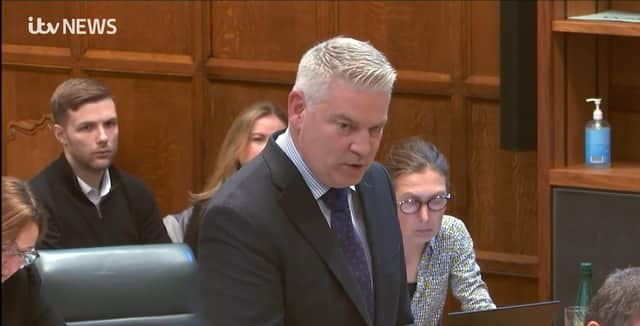Protocol latest: EU threatens UK aviation whilst court is told parts of Acts of Union have been 'modestly disapplied'


The move represents an escalation in the standoff between London and Brussels, and is effectively a warning to the UK not to enact the Protocol Bill.
It also comes as the Supreme Court in London was told by a government lawyer that the Union remains intact despite claims to the contrary – though he added that there had been a “modest disapplication” of parts of the Acts of Union.
Advertisement
Hide AdAdvertisement
Hide AdThe court today heard the second of two days’-worth of arguments concerning the Protocol, in a case brought by a string of unionist figures who are trying to obtain a ruling that a judicial review should be ordered into the legality of the Irish Sea border arrangements.
Their efforts have already been rejected by two lower courts.
Tony McGleenan KC, for the government, told the Supreme Court today "the idea that there has been a de facto termination of the union is not a tenable proposition".
Instead he described what had happened as a “modest disapplication” of the Acts of Union, the 1800 legislation which binds Ireland (now just Northern Ireland) to Great Britain under the umbrella of the United Kingdom.
Advertisement
Hide AdAdvertisement
Hide AdMr McGleenan said: “You will see that there is no serious sense in which there has been a profound constitutional change, and the argument presented by the appellants is seriously overplayed.”
Speaking outside court, one of the appellants, businessman Ben Habib, said: “We have got a really serious constitutional issue on our hands.
"This is the end of the United Kingdom unless we get this right.”
Fellow appellant Jim Allister MLA said: “His Majesty’s Government’s argument should bring home to every unionist just how constitutionally dire and dangerous the Protocol is.
Advertisement
Hide AdAdvertisement
Hide Ad"Moreover, it should confirm Unionists who care in their resolve that the Protocol must go and that there can be no let up in the political campaign against it, including the refusal to operate institutions which of necessity would have to implement this dismantling of the Union.”
The court will now consider the arguments and deliver a ruling, expected sometime next year.
Meanwhile news that the EU was preparing punitive measures against the UK if it tries to unilaterally undercut the Protocol began to filter out late on Wednesday evening.
At that time, EU negotiator Maros Sefcovic tweeted out: “Today the EU has agreed internal rules that allow us, if needed, to enforce our agreements with the UK.”
Advertisement
Hide AdAdvertisement
Hide AdThis was accompanied by a statement from Fine Gael MEP Sean Kelly, an EU trade envoy: “This evening, we reached an agreement to empower the EU with greater legal ability to protect EU rights, including a possible sanctions mechanism.”
This is a reaction against the UK “tabling legislation to take unilateral measures against an agreement we reached only two years ago”.
However, it was unclear what exactly these sanctions involve, and the News Letter spent much of Thursday trying to establish this.
A source close to the talks indicated to the News Letter that the sanctions could involve things like quotas and limits on exports, halting of preferential trade arrangements, and the imposition of conditions on aircraft.
Advertisement
Hide AdAdvertisement
Hide AdRegarding this last measure, a draft EU document published earlier in the year gives a hint of what it will involve, describing such a move as: “the refusal, revocation, suspension, limitation of and the imposition of conditions on the operating authorisations of air carriers of the United Kingdom”.
These sanctions would be imposed based on their “effectiveness... in inducing compliance” from the UK, and the “potential of the measures to provide relief to economic operators within the Union affected by the measures of the UK”.
It is still not clear precisely what would trigger all this, with the EU saying only that it will happen if “the UK reneges on its commitments or does not cooperate in a dispute settlement”.
Further agreement is needed from the European Parliament and European Council (representing heads-of-state) before these measures will be available.
More from this reporter:
Advertisement
Hide AdAdvertisement
Hide Ad